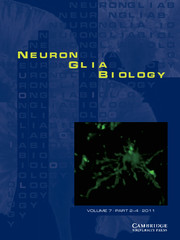Crossref Citations
This article has been cited by the following publications. This list is generated based on data provided by
Crossref.
Sikorska, Marianna
Sandhu, Jagdeep K.
Deb‐Rinker, Paromita
Jezierski, Anna
LeBlanc, Julie
Charlebois, Claudie
Ribecco‐Lutkiewicz, Maria
Bani‐Yaghoub, Mahmud
and
Walker, P. Roy
2008.
Epigenetic modifications of SOX2 enhancers, SRR1 and SRR2, correlate with in vitro neural differentiation.
Journal of Neuroscience Research,
Vol. 86,
Issue. 8,
p.
1680.
Sandhu, Jagdeep K.
Gardaneh, Mossa
Iwasiow, Rafal
Lanthier, Patricia
Gangaraju, Sandhya
Ribecco-Lutkiewicz, Maria
Tremblay, Roger
Kiuchi, Kazutoshi
and
Sikorska, Marianna
2009.
Astrocyte-secreted GDNF and glutathione antioxidant system protect neurons against 6OHDA cytotoxicity.
Neurobiology of Disease,
Vol. 33,
Issue. 3,
p.
405.
Zeevalk, Gail D.
Bernard, Laura P.
and
Guilford, F. T.
2010.
Liposomal-Glutathione Provides Maintenance of Intracellular Glutathione and Neuroprotection in Mesencephalic Neuronal Cells.
Neurochemical Research,
Vol. 35,
Issue. 10,
p.
1575.
Twomey, Erin
Li, Yan
Lei, Joy
Sodja, Caroline
Ribecco-Lutkiewicz, Maria
Smith, Brandon
Fang, Hung
Bani-Yaghoub, Mahmud
McKinnell, Iain
and
Sikorska, Marianna
2010.
Regulation of MYPT1 stability by the E3 ubiquitin ligase SIAH2.
Experimental Cell Research,
Vol. 316,
Issue. 1,
p.
68.
Smith, Brandon
Treadwell, Julie
Zhang, Dongling
Ly, Dao
McKinnell, Iain
Walker, P. Roy
Sikorska, Marianna
and
Hoheisel, Jörg
2010.
Large-Scale Expression Analysis Reveals Distinct MicroRNA Profiles at Different Stages of Human Neurodevelopment.
PLoS ONE,
Vol. 5,
Issue. 6,
p.
e11109.
Jezierski, Anna
Deb‐Rinker, Paromita
Sodja, Caroline
Walker, P. Roy
Ly, Dao
Haukenfrers, Julie
Sandhu, Jagdeep K.
Bani‐Yaghoub, Mahmud
and
Sikorska, Marianna
2012.
Involvement of NOS3 in RA‐Induced neural differentiation of human NT2/D1 cells.
Journal of Neuroscience Research,
Vol. 90,
Issue. 12,
p.
2362.
Brandmann, Maria
Tulpule, Ketki
Schmidt, Maike M.
and
Dringen, Ralf
2012.
The antiretroviral protease inhibitors indinavir and nelfinavir stimulate Mrp1‐mediated GSH export from cultured brain astrocytes.
Journal of Neurochemistry,
Vol. 120,
Issue. 1,
p.
78.
Sikorska, Marianna
Lanthier, Patricia
Miller, Harvey
Beyers, Melissa
Sodja, Caroline
Zurakowski, Bogdan
Gangaraju, Sandhya
Pandey, Siyaram
and
Sandhu, Jagdeep K.
2014.
Nanomicellar formulation of coenzyme Q10 (Ubisol-Q10) effectively blocks ongoing neurodegeneration in the mouse 1-methyl-4-phenyl-1,2,3,6-tetrahydropyridine model: potential use as an adjuvant treatment in Parkinson's disease.
Neurobiology of Aging,
Vol. 35,
Issue. 10,
p.
2329.
Lasierra-Cirujeda, Joaquín
Pascual-Salcedo, María José Aza
and
Pascual-Salcedo, María Mercedes Aza
2016.
Sulodexide and Alzheimer’s Disease: A Preliminary Prospective Study.
World Journal of Cardiovascular Diseases,
Vol. 06,
Issue. 02,
p.
54.
Higgs, Ellen B.
Godschalk, Roger
Coltman, Nicholas J.
Stewart, Grant S.
van Schooten, Frederik-Jan
and
Hodges, Nikolas J.
2020.
Induction of apoptosis in Ogg1-null mouse embryonic fibroblasts by GSH depletion is independent of DNA damage.
Toxicology Letters,
Vol. 332,
Issue. ,
p.
27.
Sandhu, Jagdeep K.
Ribecco-Lutkiewicz, Maria
and
Abulrob, Abedelnasser
2021.
Molecular and Functional Characterization of Caveolae in Mixed Cultures of Human NT-2 Neurons and Astrocytes.
Neuroglia,
Vol. 2,
Issue. 1,
p.
68.
Sandhu, Jagdeep K.
Sodja, Caroline
Ribecco-Lutkiewicz, Maria
Wu, Yu-Ting
Ma, Yi-Shing
Wei, Yau-Huei
and
Sikorska, Marianna
2022.
Effects of Tolerance-Induced Preconditioning on Mitochondrial Biogenesis in Undifferentiated and Differentiated Neuronal Cells.
Frontiers in Bioscience-Landmark,
Vol. 27,
Issue. 4,


